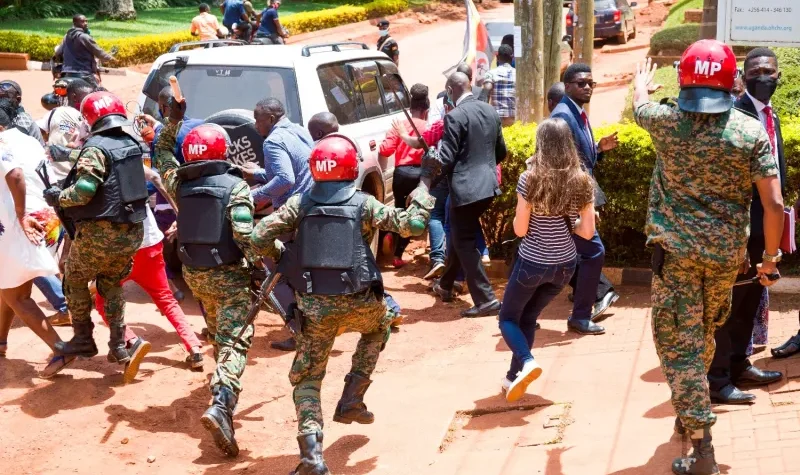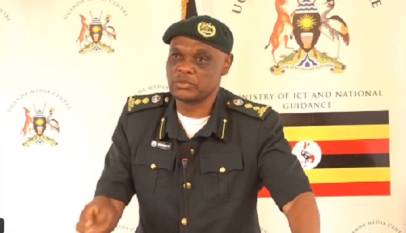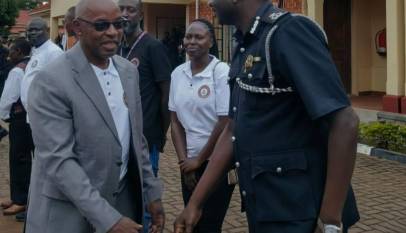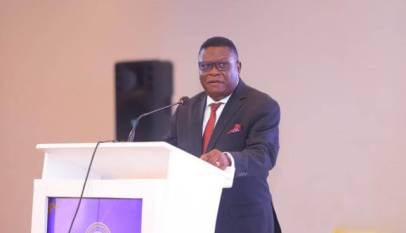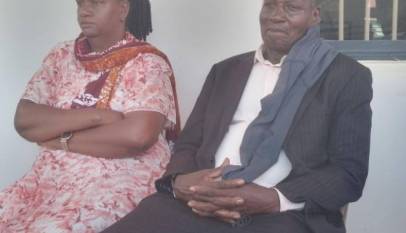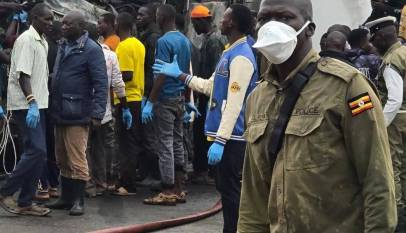Uganda Sliding into Militarized Rule Ahead of 2026 Elections – Report
A new report released by four Ugandan policy researchers and activists has raised concerns about the growing role of the military in the country’s political transition, warning that the country is on the verge of sliding into a fully controlled militarised regime.
The report, titled “Guns Everywhere! The Military and Transition Politics in Uganda,” argues that recent political and legislative developments point to the erosion of civilian authority and the rise of a parallel military government.
Authored by Godber Tumushabe, City Lawyer Andrew Karamagi, Barnet Musasizi, and Job Kiija, the report traces the evolution of Uganda’s military from the colonial era to the present, warning that the Uganda People’s Defence Forces (UPDF), though rebranded under the 1995 Constitution, remains loyal to President Yoweri Museveni and his ruling National Resistance Movement (NRM). It states that rather than transforming into a neutral national army, the UPDF continues to operate as a partisan force with deep roots in the NRA that captured power in 1986.
Speaking at the pre-launch event in Kampala, Tumushabe said the report also indicates a series of incidents over the past three years that illustrate the military’s expanding role in civilian affairs.
These, he noted, include the deployment of armed forces during the 2025 Kawempe by-election, the abduction of opposition figures, and the storming of Parliament by soldiers to influence legislation. The passing of the Uganda People’s Defence Forces (Amendment) Act in May 2025 is described as a turning point, granting sweeping powers to military courts and allowing them to try civilians, despite Supreme Court rulings against such practices.
The researchers argue that these developments amount to what they call a “slow-motion coup,” where military influence steadily displaces civilian institutions without a formal overthrow.
They warn that the country is already living through the worst-case scenario predicted in a 2021 political transition paper, which they had then described as the “Warrior-Mad-King” scenario. This, they say, is characterised by authoritarian consolidation, heavy militarisation of politics, and the rise of a politically powerful military elite.
A major concern raised in the report is the growing power of the Special Forces Command (SFC), a unit previously commanded by General Muhoozi Kainerugaba, President Museveni’s son and the current Chief of Defence Forces. The SFC has expanded far beyond its original mandate, now playing a central role in strategic national security operations, and is described as “an army within an army.”
While the report acknowledges the UPDF’s contributions to regional peacekeeping and humanitarian work, it notes that these efforts are being overshadowed by its domestic role in suppressing dissent and consolidating power. The researchers draw parallels between Uganda and countries like Chad, Togo, and Gabon, where military-backed dynastic rule has taken root.
According to the report, Uganda’s political system is being restructured in favour of military dominance, and cautions that unless urgent steps are taken to restore civilian oversight and uphold constitutional governance, the country risks democratic collapse.
Participants during the dialogue shared their thoughts, emphasising the need for Ugandans to be sensitised about peace and security, arguing that what the military is doing on the streets is not peace rather than law enforcement.
The Former UPDF Chief Defence Forces Commander, Retired Major General Mugisha Muntu, noted that Ugandans, especially the elite, should rise and unite for one cause if they need constitutional change in their country.
The full report, whose findings were documented from the outcome of seven months of an inquiry into the role of the military in Uganda’s politics, economy, religious and social arenas, is expected to be released in August, with calls for public dialogue on how Uganda can navigate a peaceful political transition ahead of the 2026 elections.
The Report was compiled under the Non-profit Organisations Innovations for Democratic Engagement and Action (IDEA) and GLISS (Great Lakes Institute for Strategic Studies.
Uganda to Extend Visas for Foreign Nationals Stranded by Iran Conflict
Chief Justice Pledges to Expedite Cases if Judiciary Receives Adequate Funding
Woman Commits Suicide Over Debts of UGX 6million
Woman Commits Suicide Over Debts of UGX 6million
Constitutional Court Dismisses Petition Against NRM-DP Cooperation Deal
Woman Commits Suicide Over Debts of UGX 6million
Gulu Central Police is investigating the circumstances under which a 52-year-old businessw…
Now On Air – 88.2 Sanyu Fm
Get Hooked Right Here
DON'T MISS!!!
Uganda to Extend Visas for Foreign Nationals Stranded by Iran Conflict
The Ministry of Internal Affairs will extend visas for foreign nationals who are stranded in the country due to the ongoing war in Iran, which has grounded flights in several Middle Eastern countries.

